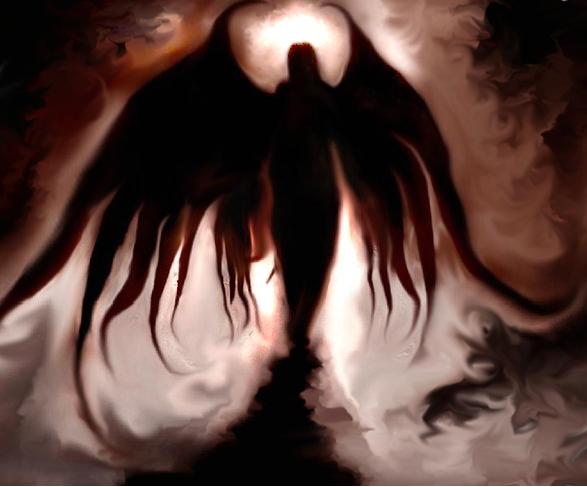
— Rabbi Nachman, Talmud, Moed Katan 28a
“In the next world, who is important? Who is honorable? Who is complete.”
Articles reporting on Joan Rivers' funeral this week said that she did not want a rabbi droning a eulogy but asked for Meryl Streep "crying in five different accents" and also wanted a wind machine so that even in the casket her hair would be "blowing like Beyonce's." She said that she had so much plastic surgery that when she died she was donating her body to Tupperware.
This funny first lady of New York will be missed but she might have taken a page out of the Talmud's playbook on death.
At the end of a particular tractate, a group of sages each encounter the Angel of Death and try to dissuade him from his duties. Much like the Angel of Death narrator in Markus Zusak's The Book Thief -- the one who hates his job -- the Talmud's Angel of Death seems more flexible than we'd suspect.
One sage, Rava, sat beside the deathbed of Rabbi Nachman. Rabbi Nachman had a favor to ask of his friend and colleague: "Master, tell the Angel of death not to torment me," as if a human being could give this scary figure advice.
Rava did not feel the conversation was necessary: "Are you not an important person?" The Angel of Death should respect Rabbi Nachman's scholarship and piety and leave him alone. That's when Rabbi Nachman quipped, "Who is important?" When the Angel of Death knocks, it matters little the pedigree or accomplishments of the human being who stands before him.
But Rabbi Nachman did grant Rava something.
Rava wanted to know -- as we all do -- what the next world would be like. He asked his teacher to return to him in a dream and let him know.
"Master, did you have pain in death?" With the gentle guidance of a sage, Rabbi Nachman assured Rava that death was not painful at all: "Like the removal of hair from milk." It was painless. But, Rabbi Nachman added, if G0D told him to go back down to earth and die again, he would refuse because his fear of the Angel of Death was so great.
Others seemed less afraid.
Rabbi Elazar was eating holy food -- food that was sanctified for special use -- when the Angel of Death knocked for him. Rabbi Elazar told him that he was busy partaking of what was sacred and the Angel of Death should, therefore, pick a different time. The moment passed. "It kills me sometimes how humans die," says the Angel of Death in The Book Thief.
The Angel of Death moved on to Rabbi Sheshet in the marketplace and with our people's signature chutzpa, he told his prosecutor that he did not want to die like an animal in the market. The Angel of Death should instead come to his house and take him with greater dignity. The Angel complied. "Even death has a heart," it is said of the Angel of Death in The Book Thief.
The marketplace must have been a hangout for the Angel of Death because he appeared to Rabbi Ashi in the same place. Rabbi Ashi encountered him and said, "Give me thirty days to review my studies, for you say fortunate is the one who comes here [to Heaven] with his learning in his hand." Rabbi Ashi wanted to be better prepared for the day of judgment. Thirty days later, the Angel of Death checked his schedule and showed up to take Rabbi Ashi. Rabbi Ashi challenged him again, "What's the rush?" This time the Angel of Death was better prepared and told him that another scholar was ready to succeed him in his leadership, and he was actually being pushed from this world.
"I am haunted by humans" says the Angel of Death in The Book Thief. Sometimes our goodness makes the Angel of Death stop in his tracks.
Joan Rivers had more than enough chutzpa to speak back to the Angel of Death. Maybe she told him some jokes and he did not like them. But if we could argue our merit to the very same Angel of Death, tell him [or her] that we deserve to stay here longer because we have important business to attend, what would you say?
If you can give a compelling self-defense of your purpose here, then mean it, mine it and celebrate it now because we don't know when that knock will come. These thoughts on our mortality dominate us as we approach our Days of Awe. "Repent the day before you die," we learn in Ethics of the Fathers. We don't know when that last day will be so our job is to make this day worthy.
Comment by clicking here.
Dr. Erica Brown is a writer and educator who lectures widely on subjects of Jewish interest. She is scholar-in-residence for the Jewish Federation of Greater Washington, DC and a consultant to other Jewish organizations. Dr. Brown is the author of Confronting Scandal, Spiritual Boredom and Inspired Jewish Leadership and co-author of The Case for Jewish Peoplehood. Her "Weekly Jewish Wisdom" column has appeared regularly in The Washington Post. She lives with her husband and four children in Silver Spring, MD.



 Contact The Editor
Contact The Editor
 Articles By This Author
Articles By This Author